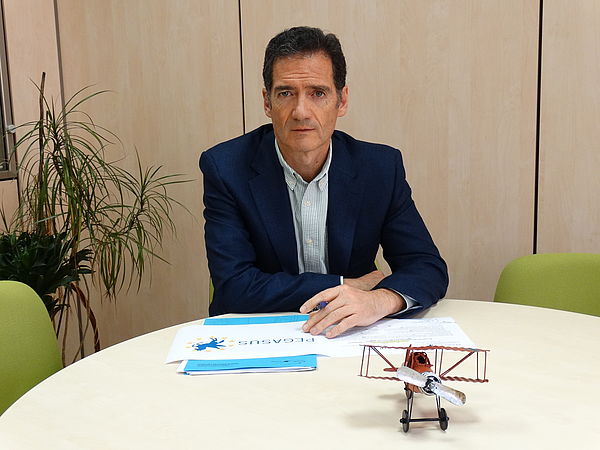PEGASUS (Partnership of a European Group of Aeronautics and Space Universities) currently consists of 27 prestigious European universities in the aerospace field from 10 countries: Germany, Spain, France, Holland, Italy, Poland, Portugal, United Kingdom, Czech Republic and Sweden.
The Universidad Politécnica de Madrid (UPM), through the School of Aeronautical and Space Engineering (Escuela Técnica Superior de Ingeiería Aeronáutica y del Espacio, ETSIAE), was one of founding members in 1998, and now, the deputy director of External Relations and Quality of ETSIAE, Gustavo Alonso, has been appointed President, thus recognizing the Madrid university as well as the work undertaken during this time by its representatives. It is recalled that in 2011-2013 period, Professor José Luis Sagredo (Escuela Técnica Superior de Ingenieros Aeronáuticos, ETSIA) served as Vice President of PEGASUS network.

Over the next two years, Professor Alonso's duties will be serve as a liaison between the network and external partners and to carry out daily tasks in terms of promotion, finance, personnel, etc.
PEGASUS aims to promote cooperation in teaching and research among the network universities, through coordination of their academic offer, as well as fostering teachers and students mobility and exchange.
The Deputy Director of External Relations and Quality of ETSIAE takes up this position setting the goal "of further deepening cooperation among partners within teaching but also research fields. Besides the traditional student conference held every year (Pegasus Student Conference), a workshop will be added for young researchers in which professors, mainly the youngest ones, will have the opportunity to present their work and ideas and get in touch with other researchers belonging to the network in order to help them to develop precisely their contacts network”.
Label and certificates for degrees
More than 2,000 aeronautical engineers graduated each year from PEGASUS member institutions obtain a qualification with PEGASUS certificate and/or label, adding more value to the training received. The certificate, received by all master's alumni from each network university, certifies that their academic degree is based on very demanding quality standards defined by the network, while the seal is for those students who have participated in some mobility programme between the network universities, in recognition of the multinational experience acquired by those student.
In this regard, PEGASUS takes part in PERSEUS project, funded by EC H2020 (European Commission Horizon 2020), seeking to define a European quality label for higher education degrees related to the aerospace sector, with the conviction that it is possible to establish a specific quality system for the sector, to complement the existing national or European accreditation systems, and to provide added value to internal and/or external quality assurance processes that are implemented in most universities across the European Union.
Current and future challenges
With respect to current and future challenges PEGASUS has to face, its newly appointed president aims "to new partners admissions and to establish a collaboration framework with similar associations in other parts of the world, such as China”.
PEGASUS also aims at representing this group with a unique voice in front of institutions and international organisations relevant to the sector, such as European Commission, European Aviation Safety Agency (EASA), EUROCONTROL, Clean Sky, etc., so that "another of the challenges we face is to reinforce this qualified voice role in these international organisations and in any other relevant forums in the field of teaching and researching in aerospace engineering”.

